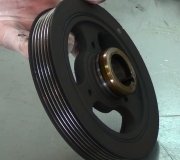Please reply back to your original question. That is a private conversation between the two of us, but it also helps others who might be researching the topic.
I have had students switch to synthetic oil, then develop horrendous leaks within days. After a few weeks the switched back to regular oil. The leaks slowed down, but it took about two months and another oil change. Those leaks never did totally clear up on their own.
I cannot say those leaks were caused by the synthetic oil. For this type of problem we prefer to discuss changing brands of oil, not type. Every oil manufacturer has their own proprietary formulas for the additives they use. All must meet the latest specifications as outlined for the current "SC" and "CD" rating on the container, and that insures it is acceptable for use in any engine currently in production.
The problem is the detergent in one oil might be fine, but it will dissolve the seal conditioner in the old oil currently in your engine. When the oil is changed, about two quarts never drains out. It is stuck in passages and in the pump. What additives remain in that old oil could render another additive in the new oil ineffective. That is not an issue after another two or three oil changes, but where people run into trouble is when they use a different brand of oil at every oil change. When you stick with one brand, you know the anti-foaming agent will work with the seal conditioner and corrosion inhibitor, and with the other additives.
I have never used synthetic oil. I went fifteen years and over 150,000 miles without changing the oil in my 1988 Grand Caravan, as an experiment. I just added one quart every 1,000 miles, and that was enough to replenish the additives. The van finally rusted apart at 420,000 miles, and was running fine up to then. I doubt it would have lasted any longer with synthetic oil.
SPONSORED LINKS
Wednesday, April 12th, 2017 AT 8:00 PM



